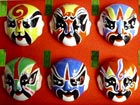| Videos | ? Latest |
|
? Feature | ? Sports | ? Your Videos |
Peking Opera mask maker Zhao Yongqi

The craft of making traditional opera masks is unique to China. It can be traced back to the 12th century when the first mask appeared in a Song dynasty opera.

They're also known as the Painted Face, a character from Peking Opera. But the masks can also be appreciated in their own right. Zhao Yongqi is a Beijing-based artist. It was his childhood dream to design, make and sell these opera masks.
Immersed in his own world, it's impossible to disturb Zhao Yongqi.
Each stroke of the brush. Every color. And Zhao turns this piece of plaster into a Peking opera mask.
A touch here, and a touch there. And it's done. A work of art, and one that anybody would be proud to own.
Zhao Yongqi said, "At first I learned to draw Peking opera masks on dried clay molds, but only during my spare time. To make ends meet, I had to take various part-time jobs as a boiler man, a waiter or even as a tailor. But my real interest lay in making opera masks.
Zhao's passion for painting the masks reflects his immersion in Peking Opera.
As a child, he was fascinated by the masks. Twenty years ago, when he was deciding what to do with his life, he took up the brush without a second thought.
Zhao never went to art school. But his dedication and the quest for perfection over the years has made him a master. It takes pinpoint precision to get the colors just right, and in the right place. The pattern on one cheek should match the other exactly. Every color has its own meaning. Opera lovers know them by heart.
Zhao said, "This is the mask of Dou Erdun, a legendary hero. His eyebrows, eyes and nose are emphasized with bright colors. They divide the face into three parts: his two cheeks and his forehead. This is called "Three Tiles". Just below each eyebrow are his weapons.
I didn't draw well at first. The facial features could only be vaguely distinguished, which, of course, was far from enough. After that, the dressing room of a theatre became my regular haunt, where I learn from Peking Opera masters how and where to draw and to apply color. These face-to-face instructions came in handy in my later drawings.
Peking opera favorites like the righteous Bao Zheng, and heroine Mu Guiying are also part of Zhao's repertoire of masks.
But his love of the art doesn't just stop with his passion.
Many years ago, Zhao set up this factory to begin producing masks for the tourist trade. It's really a workshop much more than a factory. Every mask is hand made. Each detail is unique.
As an artist and businessman, Zhao believes the masks can only come to life if they're handmade.
There are no mass assembly lines here. And the devotion Zhao has to his trade is matched by that of his workers. Zhao's passion for the masks goes beyond making them. He also wants to write about them, and reproduce them in prints. So, he's planning a book, to introduce his craft to a bigger audience.
Zhao said, I've been gleaning books and pictorials on Peking Opera masks for years. The cream of the crop, like the five schools of masks - Jing, Hao, Hou, Qiu and Qian - needs further classification. Opera masks of the Hou school rarely appear on stage nowadays, but these will go into my upcoming book to spread knowledge about this art.
Zhao was an apprentice to Liu Zengfu, a famous mask maker and authority on Peking opera.
To improve his understanding of the art, Zhao spent hours with many of the great Peking Opera masters, like Mei Baojiu, Zhao Mengli and Tan Yuanshou.
And today, Zhao spends much of his spare time designing new masks.
For him, the priority now is to promote the art and take his creations into the lives of many more people.
Zhao said, "My factory is the first and only one in China devoted solely to producing opera masks. With the meagre earnings from the factory, we recently established a specialized website to promote this art. I love this profession and want to hand it down, and at the same time, I'm always hoping that more and more people will come to love it. "
 0
0 






